Results of FY2019 Survey on Acceptance of Educational Travel to Japan
Japan National Tourism Organization (JNTO) surveyed organizations and associations nationwide accepting educational travel to Japan (e.g., prefectural tourism divisions and tourist associations) on the acceptance of educational travel to Japan in FY2019. Questionnaires were distributed to 48 organizations and associations, and completed by 47. A summary of the responses are provided on this page.
Note that the responses collected are based on the understanding of the staff member who completed the questionnaire, and may not accurately reflect the circumstances of each area. Respondents said that about one in ten school exchanges were canceled as of March 31, 2020, due to the COVID-19 pandemic.
1.Visitors to Japan by country/region
In a breakdown of visitors to Japan by country/region, about eight in ten visitors came from Taiwan and China combined, with 40% visiting from Taiwan and 39% visiting from China. The purpose and content of educational travel vary by country/region of origin as well as the students’ age group. Requests for educational travel to Japan received at the JNTO are referred to a contact in the area that meets their particular needs.
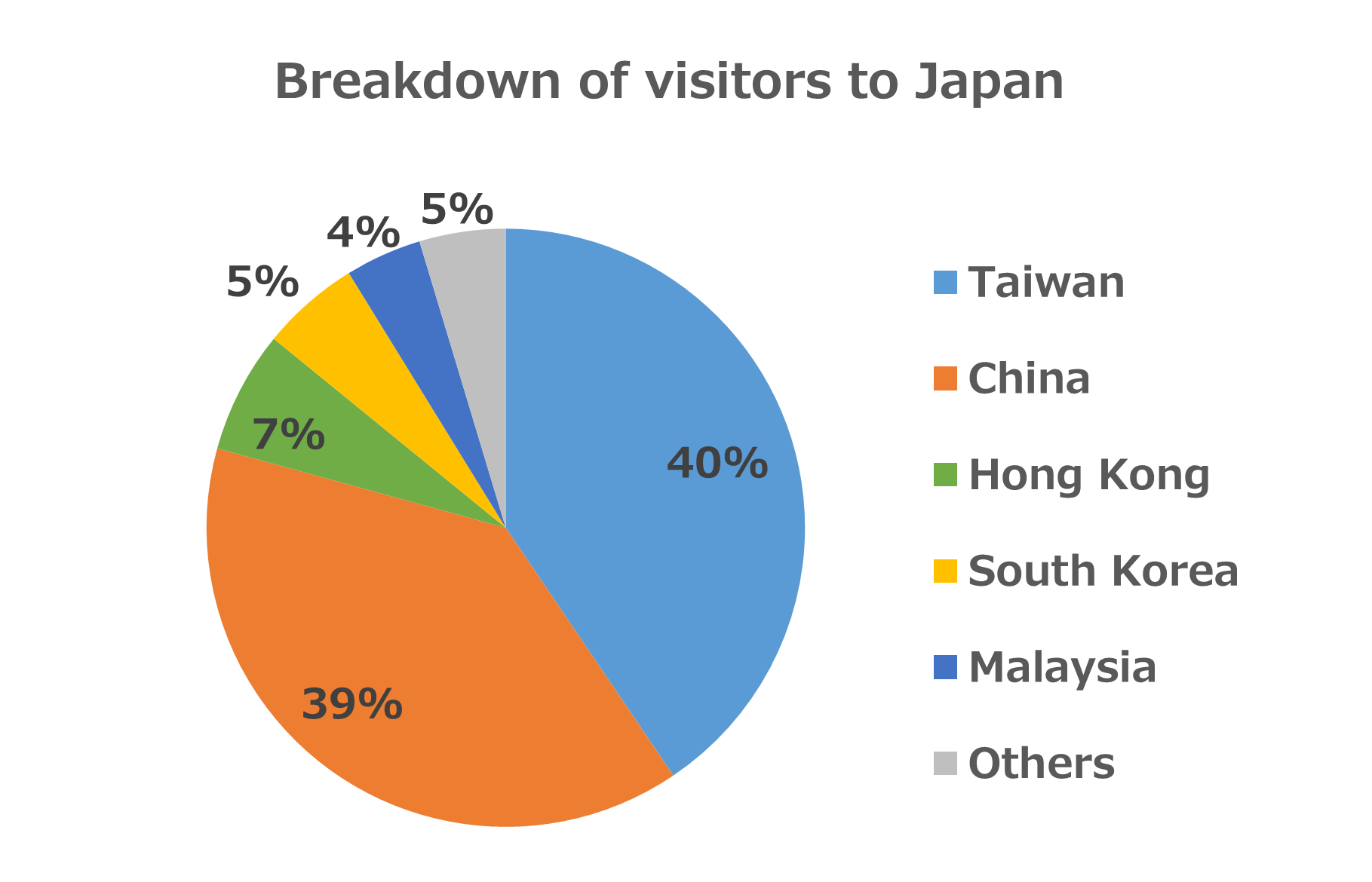
2.Host schools by educational stage
In a breakdown of host schools, high schools accounted for the largest share at 43%, followed by elementary schools at 22%, and junior high schools at 19%. Over seven in ten host schools were public schools. Educational travel to Japan is especially popular with high schools, for various purposes including school exchanges, Japanese-language learning, cultural experiences, and inspection tours.
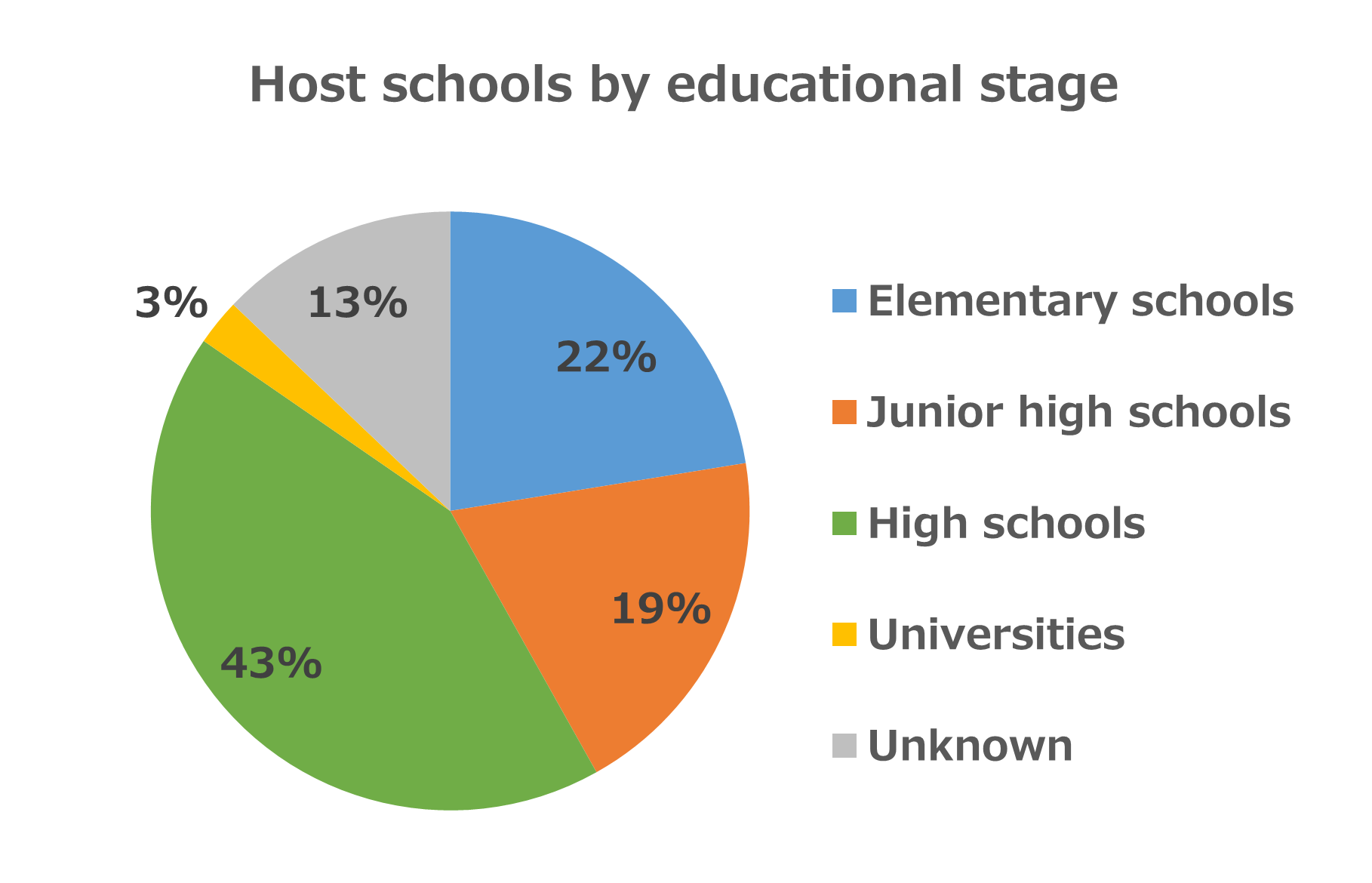
3.Days required from application to acceptance of school exchanges
School exchanges are often organized in conjunction with educational travel to Japan. When asked about the minimum number of days required from application to actual acceptance, over seven in ten respondents said they need at least 1–3 months, with 43% requiring 61–90 days and 34% requiring 31–60 days.
When applications are received at the last minute, there are fewer host schools available on the Japan side, and it may be difficult to find a match in time. Preparation is vital to a rich, rewarding exchange event. The JNTO recommends sending an application to the relevant organization or association at least 2 months in advance.
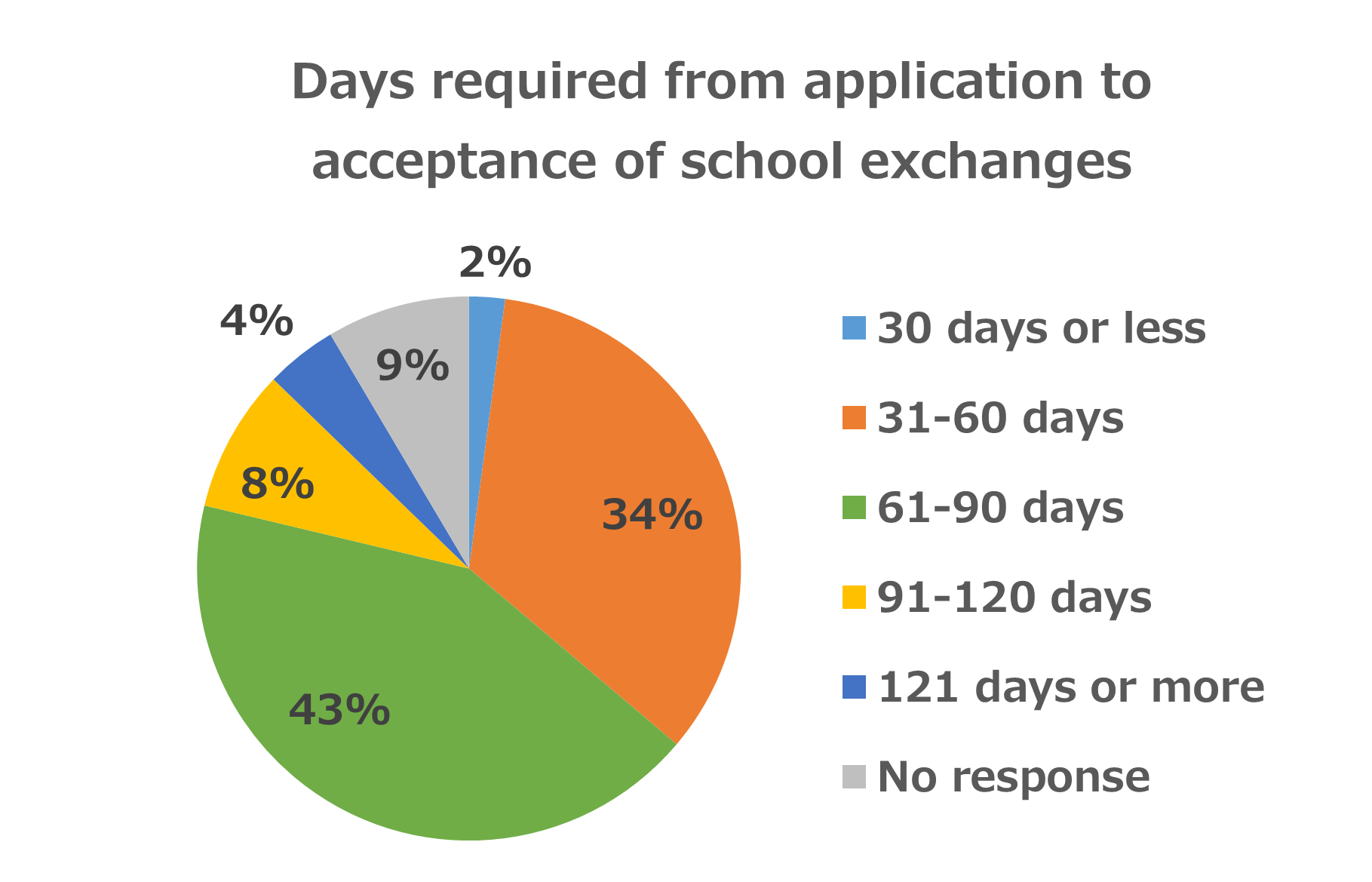
4.Average duration of school exchange
When asked about the average duration of a day’s school exchange, over half of respondents said that events concluded within a half day, with 47% lasting for 3–4 hours and 11% under 2 hours. Only under four in ten were long events lasting for 5–6 hours.
An increasing number of guest schools are requesting longer hours of exchange including lunch break. Some of the requests are for a fundamental exchange experience, where students from both schools can work together and communicate with one another.
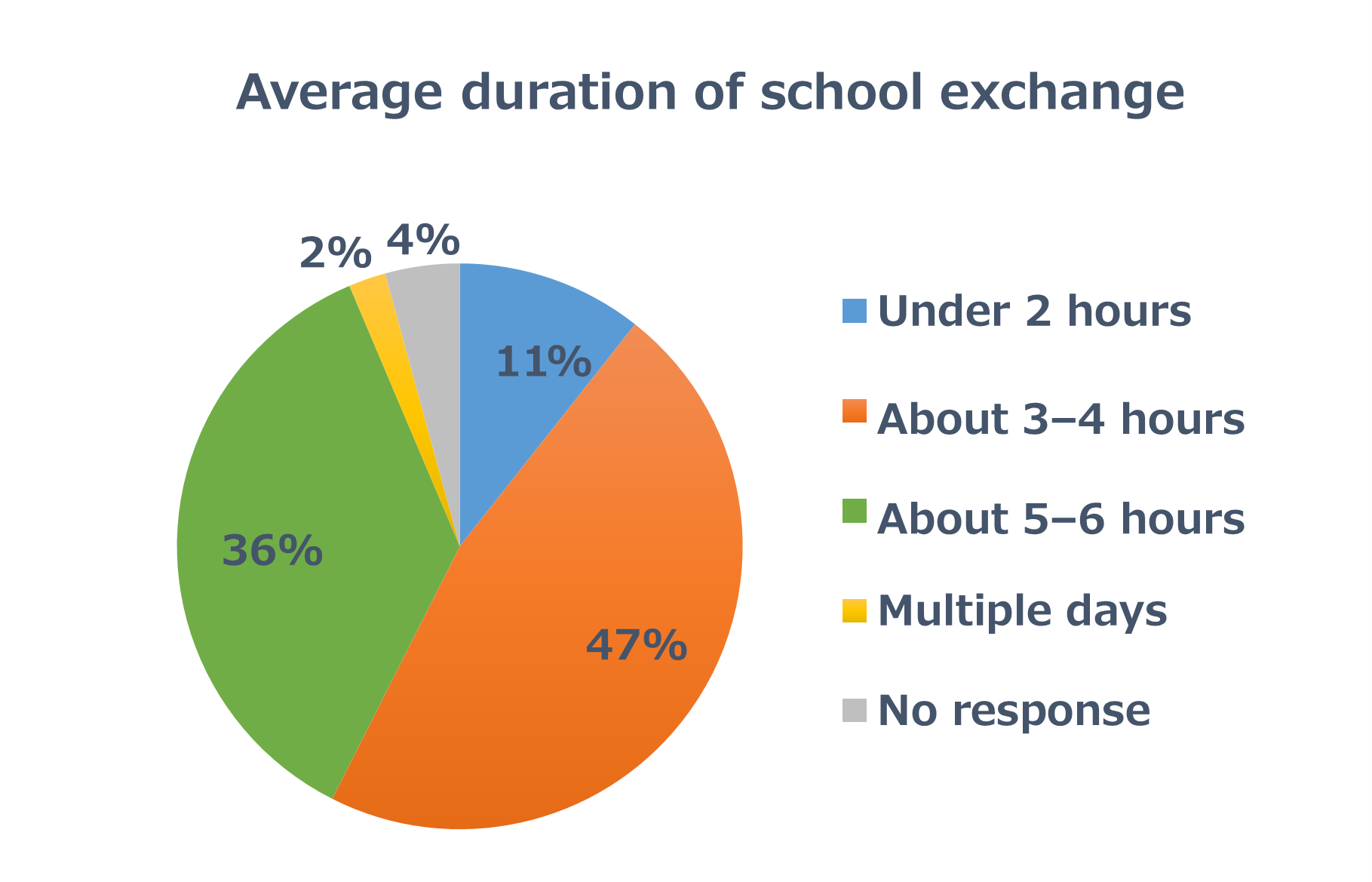
5.Dedicated application form for school exchange
When asked whether they provide a dedicated application form for school exchange, organizations and associations were split nearly in half, with 49% saying yes and 47% saying no. A dedicated application form helps clarify the guest school’s purpose of school exchange and any requests, reducing the chance of a mismatch.

6.Criteria for providing matching services for school exchange
When asked whether they define a set of criteria for providing matching services for school exchanges, over six in ten organizations and associations said yes. Examples of criteria included requiring the guest school to book accommodations in the same prefecture, send the matching request at an early stage, and submit a copy of the itinerary in advance.

7.Acceptance of homestays and farm stays
When asked whether they are prepared to meet requests for homestays and farm stays, over eight in ten organizations and associations said yes. With many guest schools also requesting homestays and farm stays, the JNTO recommends their inclusion in future exchange programs.

8.Matching services for university students
When asked whether they provide matching services for university students, over six in ten organizations and associations said matching was possible. The purpose of exchange with Japanese university students is often to find work in Japan or gain admission to a Japanese university or graduate school. The visiting side thus tends to make detailed requests, covering specifics such as the level of the university and the major selected by the student, presenting the difficulty of finding a suitable match.

9.Inspection tours by educational staff from abroad
When asked whether they accept schools inspection tours by educational staff from abroad, over eight in ten organizations and associations said yes. Some guest schools wish to observe celebrated Japanese schools, and an increasing number ask to see Super Global High Schools (SGH) designated by the Ministry of Education, Culture, Sports, Science and Technology (MEXT) as an example of Japan’s innovative educational system.

10.Preparatory learning for school exchanges
When asked whether they offer preparatory learning for school exchanges, 55% of respondents said no. The JNTO recommends carrying out preparatory learning, as it helps enhance curiosity about foreign countries and understanding of different cultures.

11.Challenges of accepting educational travel to Japan and school exchanges
Each area had its own views about the challenges of acceptance, but the three points given below were common throughout Japan.
Late application for visits
While circumstances vary by country/region of origin, many guest schools tend to be slow at planning and arranging educational travel itself, leading to late requests for school exchanges. Late application makes it difficult to find a match and places an increased burden on the host school.
Cancellation of confirmed school exchanges
Many respondents were troubled by the cancellation of confirmed school exchanges due to circumstances of the guest school, or if not cancellation, last minute changes in the number of students or the content of exchange.
Difficult periods of the year for matching
Host schools on the Japan side are not available to accept visitors during certain periods of the year, such as summer vacation and April and March in which the school year starts and ends. Some respondents also said that guest schools from the same countries/regions send visit requests for the same periods of the year, making it difficult to arrange matches.
12.Acceptance of school exchanges in FY2020 (select all answers that apply)
This survey covered plans for accepting school exchanges in FY2020 amid the COVID-19 pandemic (as of May 2020). The largest number of respondents said their FY2020 plans were currently under consideration (23), followed by those who were currently accepting as usual but had no confirmations (17). Others said they were waiting to see how circumstances develop before considering their plans in FY2020.

13.Plans for changing acceptance frequency, scale, or criteria
When asked whether they have any plans for changing the frequency of, scale of, or criteria for acceptance due to COVID-19, 36% of respondents said their plans were not decided or under consideration, and 25% said they have plans for change. Many respondents said they will take into account the wishes of the board of education and of host schools when considering changes in criteria.
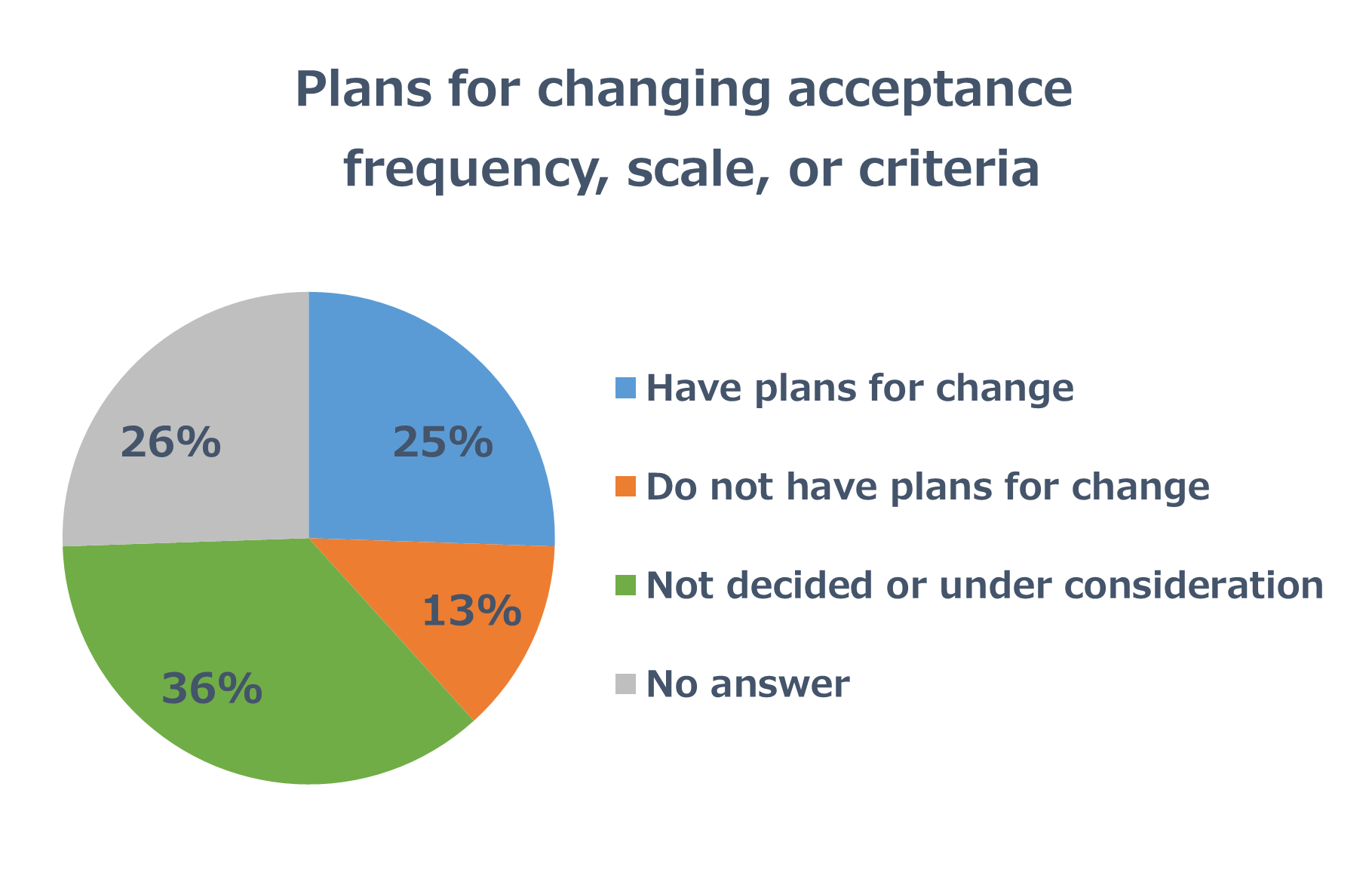
The situation with COVID-19 is changing from day to day. The JNTO plans to administer questionnaires on a regular basis covering the acceptance of and initiatives related to school exchanges.
CONTACT US
JNTO Global Projects Section
(Japanese & English Support)
TEL:+81-3-5369-3336
E-mail:education@jnto.go.jp
arrow_rightCONTACT US